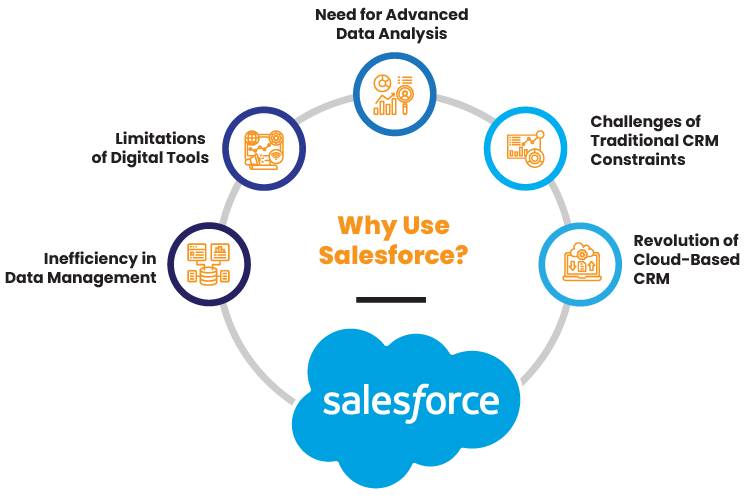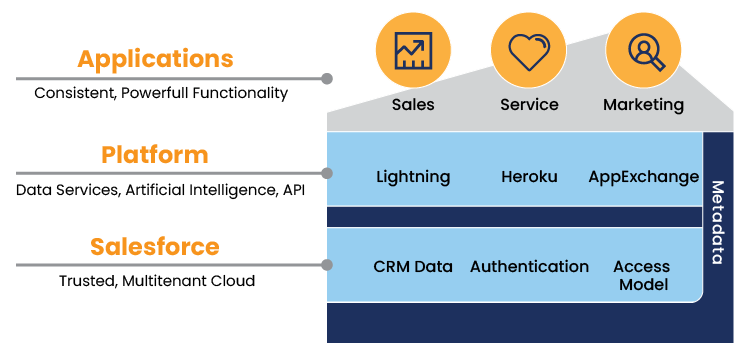

ACL Digital
8 Minutes read
Understanding Salesforce and Diverse Industrial Applications
In today’s digital era, Salesforce has become a leading CRM platform, revolutionizing how businesses manage customer relationships and drive growth. Its flexibility and scalability make it suitable for a wide range of industries, from technology and retail to insurance and banking. Salesforce enables organizations to streamline operations, enhance customer interactions, and achieve their goals efficiently. This blog explores how different sectors can harness Salesforce’s powerful features to transform their operations, improve customer experiences, and stay ahead in a competitive landscape.
Why Use Salesforce?
- Initially, employees managed data manually by jotting it down and storing it in files, leading to inefficiencies and missed insights.
- With the advent of computers, companies began using Excel sheets and documents, but this approach was time-consuming and ineffective for large data volumes.
- The need arose to handle and analyze large volumes of user data more effectively to enhance customer satisfaction.
- Traditional CRM solutions were hosted on company servers, which was time-consuming, expensive, and difficult to use.
- Salesforce addressed these issues by creating an affordable, cost-effective CRM software delivered entirely online as a service.

How Does Salesforce Work?
Salesforce operates through a cloud-based platform that offers accessibility and scalability. Following are the core components of how Salesforce works:
Cloud-Based Platform: Salesforce operates in the cloud, providing accessible and scalable CRM solutions that can be used from anywhere, minimizing maintenance and supporting remote work.
Unified Data Management: The Salesforce Data Cloud integrates and harmonizes data from various sources (historical, web, mobile, API, CRM, real-time), offering a comprehensive view of customer information on a single secure platform.
AI-Driven Insights: Salesforce’s Einstein Copilot, an AI assistant, automates tasks, personalized content, and generates code, leveraging predictive and generative AI to boost productivity and performance.
Content Optimization: Einstein continuously learns from data to optimize the performance of generated content (such as emails and product descriptions), ensuring effectiveness and improving results over time.
Seamless Communication: Integration with Slack enhances communication and collaboration among customers, teams, and partners, facilitating efficient digital workflows and boosting overall productivity.
Salesforce Architecture
Multi-Tenant Architecture
Salesforce operates on a multi-tenant architecture, where a single database schema is shared among multiple clients. This model allows several customers to utilize a single instance of the software, significantly reducing costs and simplifying maintenance. In contrast to single-tenant systems, where costs and management are borne by individual clients, multi-tenant architecture offers a more cost-effective solution by sharing resources among multiple users.
Metadata-Driven Development
Salesforce employs a metadata-driven approach to application development. This means developers work with metadata rather than directly modifying code. This architecture simplifies customization and scalability, enabling users to adjust and extend the platform’s capabilities without altering the core codebase. It allows for rapid development and deployment of tailored solutions.

Robust API Integration
Salesforce offers a comprehensive suite of APIs, essential for enhancing and personalizing the Salesforce1 Mobile App and other integrations. These APIs facilitate smooth development and customization by providing precise control over various features and functionalities. This ensures that every aspect of the Salesforce platform can be tailored to meet specific needs and integrate seamlessly with other systems.
Benefits of Salesforce
Salesforce offers a range of benefits that significantly enhance business operations and customer interactions. Following are its robust features that support better customer satisfaction, simplified account planning, and reliable reporting, making it an invaluable tool for businesses aiming to thrive in a competitive market.
Enhanced Time Management
Salesforce streamlines time management by consolidating essential customer data and planning tools into one platform. Instead of wasting time searching through various records, you can access all necessary information in one place. The integrated calendar helps schedule and manage tasks, meetings, and calls efficiently, ensuring you stay organized and focused.
Seamless Accessibility
As a cloud-based solution, Salesforce provides global access through any device with internet connectivity. Whether you’re on a desktop, laptop, or smartphone, you can retrieve and manage critical data from anywhere. This accessibility is vital for team members and business leaders who travel frequently, ensuring continuous productivity and secure data handling.
Boosted Revenue Potential
Salesforce enhances revenue by automating administrative tasks and managing data effectively. Instead of manually sorting through data, Salesforce handles these tasks, freeing up time for more strategic activities. This shift allows businesses to focus on building relationships and pursuing growth opportunities, ultimately increasing profitability.
Elevated Customer Satisfaction
By utilizing Salesforce’s comprehensive CRM tools, businesses can offer a more personalized customer experience. Access to detailed client information and history helps tailor interactions and services, enhancing satisfaction. Improved efficiency in managing client relationships not only strengthens existing connections but also attracts new customers through positive word-of-mouth.
Efficient Account Planning
Salesforce simplifies account management by centralizing customer data and facilitating effective planning. With all relevant information readily available, you can create targeted strategies for each account. This ensures that products and services are customized to meet specific client needs, leading to more successful outcomes and stronger client relationships.
Reliable Reporting
Salesforce offers robust reporting capabilities that transform complex data into actionable insights. By organizing and analyzing information from various sources, Salesforce helps businesses make informed decisions. Accurate and reliable reporting ensures that you can trust the data you’re working with, guiding strategic planning and operational improvements.
Enhanced Team Collaboration
Salesforce promotes better team collaboration through its “Chatter” feature, which enables communication and information sharing among team members. This tool allows for seamless interaction on client-related matters and internal projects, fostering a cohesive work environment and ensuring that everyone stays aligned with organizational goals.
Which type of Industries Leverage Salesforce?
Manufacturing
Manufacturers benefit from Salesforce’s Manufacturing Cloud, which provides real-time supply chain visibility, efficient production management, and accurate demand forecasting. These capabilities lead to better inventory management, cost reductions, and increased customer satisfaction.
Education
Salesforce’s Education Cloud supports educational institutions by assisting with student recruitment, enrollment management, and alumni engagement. Analytics tools help schools and universities make data-driven decisions to enhance student performance and academic outcomes.
Healthcare
Salesforce enhances the smart healthcare solution providers by centralizing patient data and streamlining appointment scheduling with Health Cloud. Providers can offer personalized care and engage patients through targeted health campaigns using Salesforce’s Marketing Cloud, improving overall patient engagement.
Retail and E-Commerce
Salesforce revolutionizes the retail and e-commerce sectors by enabling businesses to harness customer data for personalized shopping experiences. With tools for data-driven marketing, inventory optimization, and seamless omnichannel support, retailers can build engaging e-commerce platforms and enhance the overall customer journey.
Real Estate
Salesforce’s Real Estate Cloud offers solutions for property management, lead generation, and customer relationship management. Real estate professionals can automate workflows, manage listings efficiently, and keep clients informed about property updates.
Financial Services
In financial services, Salesforce’s Financial Services Cloud offers tailored solutions for managing client interactions, tracking financial goals, and ensuring compliance. It provides a comprehensive view of each client, improving advisory services and building trust within the industry.
Conclusion
Salesforce is a CRM platform that is transformative and greatly improves business operations across various industries. The architecture of its cloud is designed to be accessible and scalable, and unified data management and AI-driven insights streamline processes and enhance productivity. Salesforce’s advanced capabilities aid in the improvement of time management, revenue potential, and customer satisfaction. Salesforce’s versatile tools can assist businesses in optimizing operations, making informed decisions, and staying competitive in a rapidly evolving digital environment, whether they are in manufacturing, healthcare, retail, or any other sector.
For the latest updates or additional information, feel free to contact ACL Digital.
Related Insights


Death to Prompting! Long Live Programming!

The Architecture of Agentic RAG: Reasoning-Driven AI Systems Explained


The AI Developer’s Guide to Data Formats: TOON vs. JSON and Beyond

